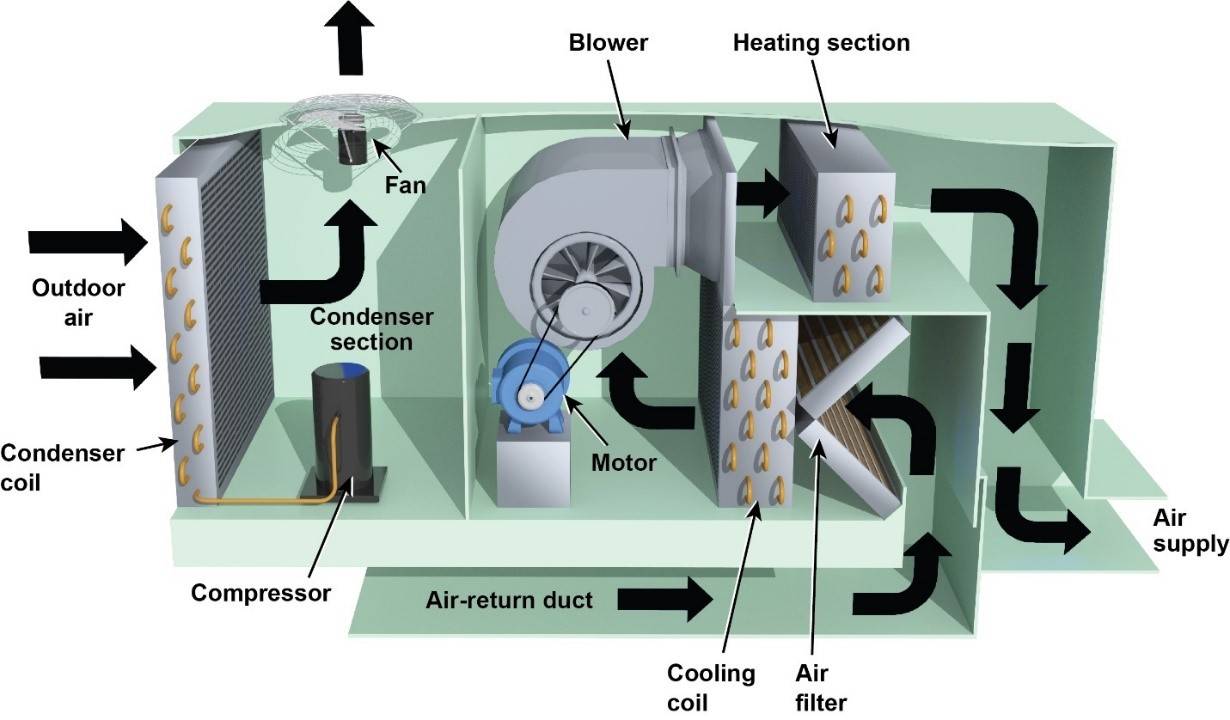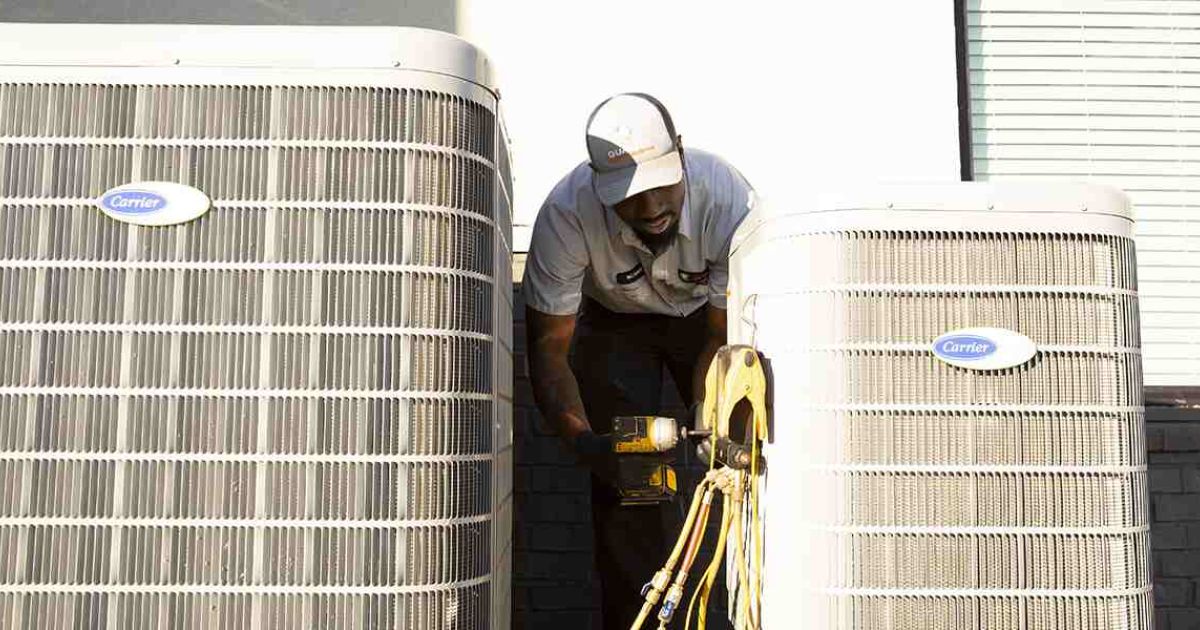An Extensive Look at HVAC Providers and Their Influence On Power Effectiveness and Cost Financial Savings
The role of heating and cooling solutions in improving energy effectiveness and accomplishing price savings is a lot more crucial than ever, as organizations and homeowners look for lasting options in a progressively eco-conscious world. With technological advancements like smart thermostats and high-efficiency parts, the potential for optimizing system efficiency is large. Yet, real influence of these innovations depends mainly on normal upkeep and proactive issue monitoring. As we discover the intricate connection in between cooling and heating systems and operational prices, consisting of the shift towards environmentally friendly alternatives, the inquiry arises: exactly how can these techniques be efficiently implemented to make best use of both environmental and economic benefits?

Relevance of HVAC Equipments
HVAC systems are an essential part of modern-day buildings, playing a critical duty in maintaining comfortable and healthy interior environments. These systems, including home heating, air, and ventilation conditioning, are crucial for managing temperature level, humidity, and air quality, therefore guaranteeing the wellness of residents. Efficient cooling and heating systems contribute significantly to producing an optimum interior environment, which is critical for both industrial and residential rooms.
In business buildings, cooling and heating systems are integral to providing a safe and effective setting. By regulating indoor environment conditions, these systems help protect against the growth of mold and the spread of air-borne pollutants, therefore guarding the health and wellness of employees and consumers. Furthermore, in domestic setups, HVAC systems enhance living conditions by offering constant thermal convenience and boosting interior air quality, which is important for overall wellness.
Additionally, the layout and maintenance of a/c systems have a straight effect on energy consumption and functional prices. Effectively created and kept systems can substantially lower power use, leading to reduced utility expenses and a smaller carbon impact. The efficiency of these systems therefore plays a crucial role in promoting sustainability and energy preservation within buildings, highlighting their significance in the modern-day building landscape.
Advancements in Heating And Cooling Technology
Advancement in heating and cooling innovation is revolutionizing the means structures handle indoor climates, ushering in a new age of performance and control. Recent developments have concentrated on maximizing power consumption while boosting user convenience. One significant development is the combination of wise thermostats, which utilize expert system to find out occupancy patterns and readjust temperature levels appropriately, lowering unneeded energy use.
Variable Refrigerant Flow (VRF) systems represent one more substantial jump ahead. These systems permit for exact temperature level control in different areas of a structure, boosting comfort and lowering energy waste. VRF innovation is specifically useful for large industrial spaces, offering adaptability and scalability.
In addition, the arrival of Internet of Things (IoT) devices has actually transformed cooling and heating systems right into interconnected networks qualified of real-time data collection and evaluation. This connection makes it possible for anticipating upkeep, ensuring systems operate at peak performance and decreasing unforeseen downtime.
Moreover, advancements in materials and style, such as using high-efficiency coils and compressors, have boosted general system performance - Heating Contractor. The fostering of environmentally friendly refrigerants likewise underscores the sector's commitment to sustainability
These technological advancements are crucial in reducing functional prices and environmental effect, setting brand-new criteria for constructing environment administration.
A/c Maintenance and Performance
Making sure ideal performance of HVAC systems prolongs beyond technical developments; it also depends upon efficient upkeep practices. Routine upkeep is vital for maintaining effectiveness, lowering energy intake, and extending the life expectancy of cooling and heating systems. The primary objective is to guarantee that all components function at their peak possibility, thereby decreasing energy wastage and preserving constant interior comfort degrees.
Routine upkeep tasks, such as cleansing or changing air filters, examining cooling agent degrees, and examining ductwork for leaks, are necessary for preventing unneeded strain on the system. Stopped up or unclean filters can block airflow, creating the system to function more challenging and eat more power. Likewise, poor refrigerant levels can reduce cooling down performance, resulting in higher functional prices.
Additionally, periodic inspections by qualified professionals can recognize prospective issues prior to they escalate right into expensive repairs or system failures. These examinations commonly include checking electrical connections, adjusting thermostats, and making certain the total honesty of the cooling and heating system. By addressing small problems early, organizations and homeowners can prevent unexpected breakdowns and enhance power effectiveness.
Cost-Effective Cooling And Heating Solutions
For those seeking to obtain the most out of their home heating, air, and ventilation conditioning systems without breaking the financial institution, exploring cost-effective cooling and heating options can make a considerable distinction. One instant action is to spend in programmable thermostats, which allow individuals to set particular temperatures for various times of the day, enhancing power use and reducing unnecessary consumption. By automating temperature More hints adjustments, property owners can attain substantial cost savings on energy costs.
Normal upkeep is an additional crucial element of affordable heating and cooling administration. Making sure that filters are cleansed or changed frequently, ductwork is sealed, and devices are serviced by experts can protect against costly repair YOURURL.com work and enhance system longevity. Preventive upkeep not only keeps system effectiveness but also aids in staying clear of unanticipated breakdowns that can bring about pricey emergency repairs.
Furthermore, retrofitting existing systems with energy-efficient components, such as variable rate electric motors or high-efficiency compressors, can be a sensible financial investment. These upgrades improve operational performance, decrease power usage, and can often be implemented at a portion of the expense of a complete system substitute.
Environmental Impact Decrease
Reducing the ecological impact of HVAC systems is essential in today's pursuit of lasting living. Heating and cooling systems are considerable factors to power consumption, accounting for virtually 40% of energy use in industrial structures.
Technical developments in a/c style and operation, including the combination of wise thermostats and energy-efficient heatpump, are essential in reducing carbon impacts. These innovations enable optimized power usage, minimizing wastage and improving total system performance. Furthermore, adopting regular upkeep methods ensures cooling and heating systems operate at peak effectiveness, further curtailing unneeded power intake.
Additionally, using eco pleasant cooling agents is critical, as typical cooling agents, like CFCs and HCFCs, have been eliminated due to their ozone-depleting properties. Modern alternatives, such as hydrofluoroolefins (HFOs), offer lowered environmental threats, straightening with worldwide environmental procedures. By embracing these sustainable methods, cooling and heating solutions can play a transformative function in minimizing ecological impacts, promoting power effectiveness, and cultivating a more sustainable future.
Verdict

Furthermore, the design and upkeep of HVAC systems have a direct impact on power intake and operational prices. Regular maintenance is essential copyright air conditioning units for maintaining efficiency, minimizing power intake, and expanding the life span of A/c systems. A/c systems are significant factors to power usage, accounting for nearly 40% of power use in commercial buildings. Additionally, adopting routine maintenance methods ensures Heating and cooling systems operate at peak efficiency, further curtailing unnecessary energy intake.
The change to environmentally friendly HVAC systems even more reduces operational costs and promotes sustainability. (Heating Contractor)